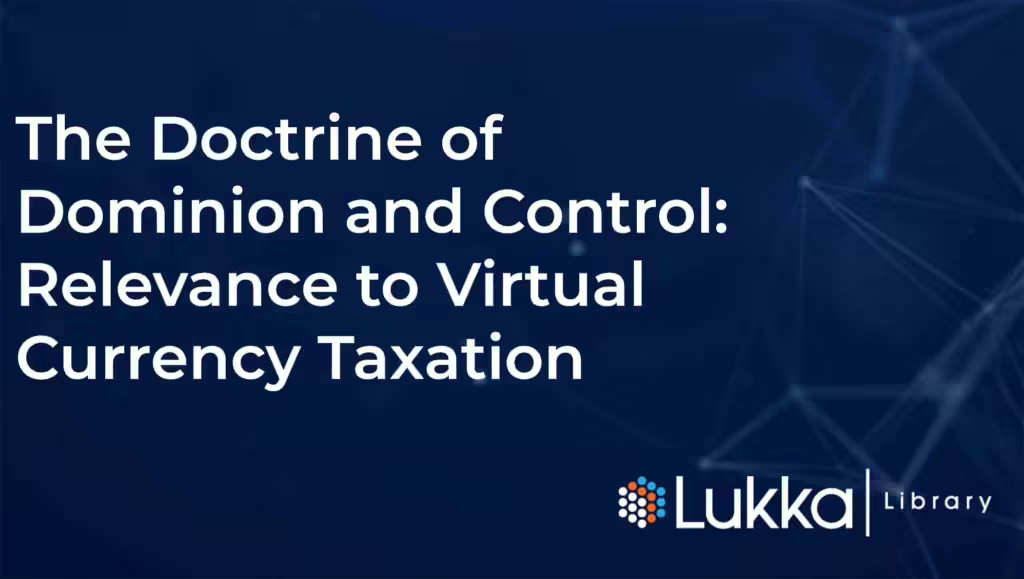Author: Annette Nellen, CPA, Esq.1
This paper is presented for general information only. It may not be relied upon as legal or tax advice. It serves to aid understanding of virtual currency tax matters for use by or discussion with appropriate tax professionals.
The tax law includes many doctrines created by the courts to resolve interpretive needs where specific statutory, administrative and judicial guidance is insufficient to resolve a matter before the court. Likely the most famous tax doctrine is substance over form. Another doctrine, getting renewed attention when the IRS issued Revenue Ruling 2019-24 in October 2019, is the dominion and control doctrine. The 2019 ruling used this doctrine to explain the income tax treatment of a hard fork of a virtual currency.
This paper explains the dominion and control doctrine and how it is used to resolve certain tax questions. The explanation covers a few of the many cases and IRS rulings where the doctrine was applied and explains weaknesses with the IRS application of the doctrine in its 2019 ruling.
The dominion and control doctrine typically comes into play in at least two scenarios. One is in the context of a “gift” and knowing whether the donor has transferred ownership of an asset to a donee, thereby creating a gift scenario. For example, Income Tax Reg. 25.2511-2 (cessation of donor’s dominion and control) uses this concept to determine when a gift is complete. The gift of an asset is complete when “the donor has so parted with dominion and control as to leave in him no power to change its disposition, whether for his own benefit or for the benefit of another.”
The second scenario involves whether the receipt of something constitutes income. For example, the doctrine was applied in Ginsburg v. U.S., 922 F.3d 1320 (Fed. Cir. 2019) to determine whether receipt of a $1.9 million refundable state tax credit was income or just a “cash transfer” and non-taxable recovery of capital related to the redevelopment project that led to the tax credit. Citing to a critical 1955 U.S. Supreme Court case that applied the dominion and control test in defining income, the court found that the tax credit was income. Per the court, the tax credit received by the taxpayer “is taxable gross income because it is an undeniable accession to wealth over which the Ginsburgs have complete dominion and control.” There was an “economic gain” to the Ginsburgs for participating in the state’s redevelopment program. The court also observed that the Ginsburgs had “complete dominion and control over the payment” of the tax credit as “there is a legally-adequate guarantee that they will be allowed to keep the excess amount of the tax credit, barring actionable misconduct on their part.”
It is the second scenario where the dominion and control doctrine is used to define income that is relevant in considering the tax effects of a hard fork and the application of the doctrine in Revenue Ruling 2019- 24. Additional background on the dominion and control doctrine to determine if receipt of something constitutes income follows.
Glenshaw Glass Co., 348 US 426 (1955) involved the tax treatment of punitive damages received for fraud and antitrust violations. Glenshaw did not include the receipt of these damages in its income. Glenshaw claimed that because the damages were not derived from labor or capital, they did not meet the federal income tax law’s definition of gross income. The Court found this interpretation too narrow. Per the Court, gross income also includes “instances of undeniable accessions to wealth, clearly realized, and over which the taxpayers have complete dominion.”
The dominion and control doctrine has been applied to determine if a transfer of funds is a non-taxable deposit or a taxable advance payment. In Commissioner v. Indianapolis Power & Light Co., 493 U.S. 203 (1990), the Court found that “deposits” collected from a utility company’s new customers to ensure payment of future bills, was a deposit rather than taxable income. If customers regularly paid their bills, the deposits were returned, typically by applying the amount to the customer’s outstanding balance.
The Court’s rationale for finding that the “deposits” were non-taxable deposits rather than taxable advance payments for utility services was that customers rather than the utility company “controlled the ultimate disposition of a deposit.” IPL also treated the deposits as customer assets on its books and paid interest to customers. The Court acknowledged that IPL obtained an economic benefit from holding the customer deposit. The Court concluded though that “a taxpayer does not realize taxable income from every event that improves his economic condition. A customer who makes this deposit reflects no commitment to purchase services, and IPL’s right to retain the money is contingent upon events outside its control. We hold that such dominion as IPL has over these customer deposits is insufficient for the deposits to qualify as taxable income at the time they are made.”
While the deposit versus advance payment scenario is not fully equivalent to a hard fork of a virtual currency, the holding of IPL is relevant in acknowledging that in scenarios involving possible income, the dominion and control doctrine helps answer the question of whether something is income rather than only addressing when the receipt of something is income. Similarly, Technical Advice Memorandum (TAM) 200849015, involved sale of gift cards and whether the proceeds were income or a deposit. The IPL case was applied by the IRS in this TAM to find that the proceeds from the issuance of gift cards was income. Per the IRS: “Taxpayer receives payments over which it exercises complete dominion and control, and over which it holds under a claim of right unless, and until, a subsequent event occurs that would require it to transfer amounts to retailers or refund amounts to a customer. Therefore, the payments that Taxpayer receives for gift cards are not deposits and are income.”
Rulings involving the dominion and control doctrine applied in fact patterns more akin to a hard fork than the deposit versus advance payment context involve ones where taxpayers received unsolicited property. For example, Haverly, 513 F.2d 224 (7th Cir. 1975) involved the tax treatment of unsolicited textbooks a school principal received from publishers in 1967 and 1968. The estimated value was $400. In 1968, Haverly donated the books to the school’s library and claimed a charitable contribution deduction of $400. He did not report any income from receipt of the books. The IRS argued, and the court agreed, that in the year Haverly claimed the tax deduction, he also had to report income from receipt of the books because the act of donating the books caused recognition of income. The act of donating them and claiming a tax deduction “manifested an intent to accept the property or exercised ‘complete dominion’ over” them.
The court noted its result was like that in Revenue Ruling 70-498 where a book reviewer for a newspaper had to include the value of unsolicited books he received when he donated them to charity and claimed a charitable contribution deduction (similarly, see GCM 36639 (3/22/76).
A similar fact pattern and result is described in TAM 8109004 where an elected official received unsolicited season tickets from two professional sports team that used a stadium the official had supervision over. The official donated the one set of tickets to charity and used the other set personally. In finding that the official realized gross income upon exercising “complete dominion” over the unsolicited property, the IRS stated:
“A taxpayer who uses the cash receipts and disbursements method of accounting ordinarily must include items of gross income in the taxable year when actually or constructively received. See section 1.451-1(a) of the regulations. However, where a taxpayer receives ‘unsolicited’ property that is otherwise includible in gross income, the Internal Revenue Service has determined that the property is includible in income only when the taxpayer manifests acceptance of the property by exercising dominion and control over such property.”
A similar result was reached in TAM 8109003 which found that dominion and control was exercised when the unsolicited tickets were given to friends or family.
In these rulings involving unsolicited property, the court and IRS did not find that mere receipt of the property created taxable income. Instead, some act of dominion and control over the property was necessary to lead to income realization. And the timing of that act then governed when the income was reportable.
In Revenue Ruling 2019-24, the IRS states that a holder of virtual currency held in an account owned or controlled by the taxpayer has income when the new currency resulting from a hard fork is recorded on the distributed ledger because the taxpayer “immediately has the ability to dispose of” the new currency. This conclusion is not in line with dominion and control rulings.
The currency resulting from the hard fork is unsolicited property and per the rulings discussed earlier, is not income until the taxpayer exercises dominion and control over the currency. The fact that the new currency is recorded on the distributed ledger is analogous to mere receipt of unsolicited books or tickets. There must be some action by the recipient before there is income. For example, the recipient disposes of the new currency or takes action to move it into a wallet to allow the recipient to use the currency. Mere receipt or potential access to unsolicited property is not enough to cause a taxpayer to have taxable income.
While Revenue Ruling 2019-24 applies to hard forks (although it mistakenly refers to the currency resulting from the hard fork as an airdropped currency), the dominion and control doctrine is also relevant to receipt of virtual currency via an air drop because that too is typically received as unsolicited property. Taxpayers would not have income for tax purposes until they take some action to exercise dominion and control over the new currency. At such time, the taxpayer realizes ordinary income based on the currency’s fair market value at that point in time. Documentation of the distributed ledger events and taxpayer actions and dates is important for determining when, if ever, the taxpayer has income. Decisions must also be made as to how the taxpayer will apply (or not apply) Revenue Ruling 2019-24.
For additional information on Revenue Ruling 2019-24 and issues it raises, see other papers in the Lukka Library on this topic as well as the following comment letters on the ruling:2
- Eight members of Congress [12/20/19] (They note a few concerns including that the treatment of “dominion and control … appears to diverge from established rules.”)
- New York State Bar Association Taxation Section [1/26/20]
- American Institute of Certified Public Accountants (AICPA) [2/28/20]
1 Professor and Director, Master of Science in Taxation Program, San José State University. Any statements in this document should only be attributed to Professor Nellen and not to San Jose State University, or any professional or educational institutions of which she is affiliated.
2 For links to the letters, see the author’s virtual currency website at https://www.21stcenturytaxation.com/virtual currency-and-tax.html.



